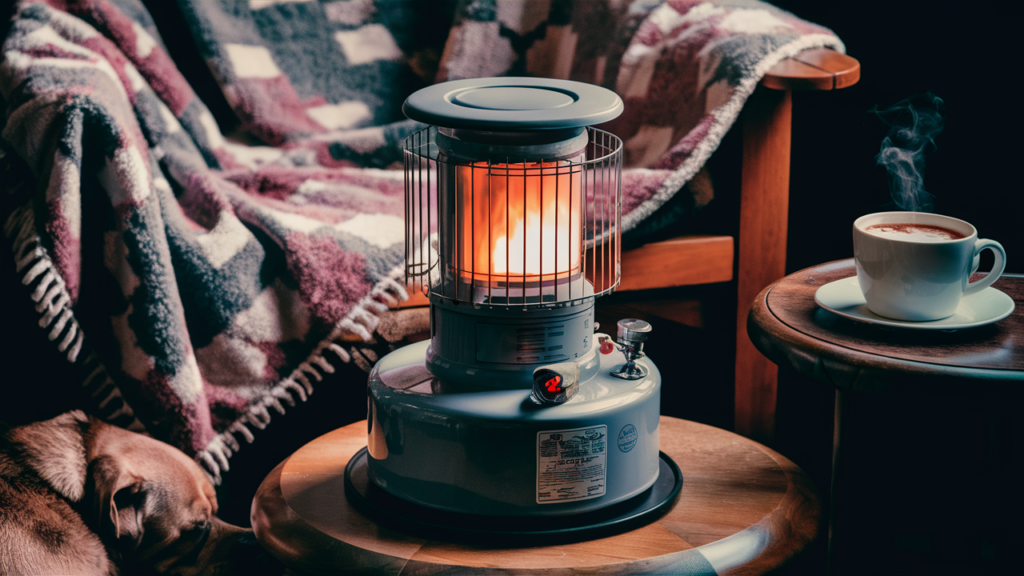Yes, you can use a propane heater in a garage. Ensure proper ventilation and follow safety guidelines to prevent hazards.
Recommended Propane Garage Heater 2025
| Recommendation | Product |
| Best Overall | SANAUVULCAN Portable Propane Heater for Garage |
| Popular Choice | Mr. Heater Propane Forced Air Heater |
| Best Value | B30TPB-BB Ventless Propane Heater with Thermostat |
| Best Budget | Mr. Heater Portable Propane Radiant Heater |
| Another Excellent Pick | BILT HARD 85,000 BTU Forced Air Propane Heater |
Using a propane heater in your garage can provide effective warmth during colder months. Many garage spaces lack adequate insulation, making heating a challenge. Propane heaters offer a portable and efficient solution for maintaining a comfortable temperature. However, safety must be a priority.
Proper ventilation is crucial to prevent the buildup of harmful gases. It’s also essential to choose a heater designed for indoor use. Understanding the specific requirements and safety measures will help you enjoy the benefits without compromising your health or safety. This guide will explore the key considerations for using a propane heater in your garage effectively and safely.
Introduction To Propane Heaters In Garages
Propane heaters are a popular choice for garage heating. They provide quick warmth and are easy to use. Many homeowners rely on them during winter months. Understanding how these heaters work helps in making a good choice.
Popularity And Benefits
Propane heaters have gained popularity due to their many benefits:
- Efficient Heating: They warm up spaces quickly.
- Cost-Effective: Propane is often cheaper than electricity.
- Portability: Many models are easy to move around.
- No Electricity Required: Ideal for places without power.
These advantages make propane heaters a practical choice for garages.
Types Of Propane Heaters Suitable For Garages
Several types of propane heaters are suitable for garage use:
| Type of Heater | Features | Best For |
|---|---|---|
| Portable Heaters | Lightweight and easy to move | Small garages or workshops |
| Wall-Mounted Heaters | Space-saving design | Larger garages with limited floor space |
| Infrared Heaters | Direct heat to objects | Quick warmth in drafty garages |
Choosing the right type depends on garage size and usage.
Safety Concerns With Propane Heaters
Using a propane heater in a garage can be convenient. However, it comes with significant safety concerns. Understanding these risks helps ensure safe usage.
Risks Of Carbon Monoxide Poisoning
Carbon monoxide (CO) is a silent killer. It is colorless and odorless, making it hard to detect.
Here are some key points about carbon monoxide:
- Symptoms: Headaches, dizziness, and nausea.
- Source: Incomplete combustion of propane.
- Prevention: Install a CO detector in your garage.
Regular maintenance of your heater is crucial. Ensure proper ventilation to minimize CO buildup.
Potential Fire Hazards
Fire risks are high with propane heaters. Understanding these hazards can prevent accidents.
Consider these fire safety tips:
- Keep flammable materials away from the heater.
- Ensure proper spacing between the heater and walls.
- Do not leave the heater unattended.
- Use a heater with an automatic shut-off feature.
Always check for leaks. A small leak can lead to a big fire.
| Safety Tip | Description |
|---|---|
| Ventilation | Ensure good airflow to reduce CO risks. |
| Distance | Keep heater at least 3 feet from all objects. |
| Monitoring | Install alarms for CO and smoke. |
Stay safe while using propane heaters. Awareness and preparation are key.
Proper Installation And Ventilation
Using a propane heater in your garage requires careful attention to installation and ventilation. Proper setup ensures safety and efficiency. Let’s explore the key aspects to consider.
Choosing The Right Location
Placement of your propane heater is crucial. Here are some tips:
- Distance from Flammable Materials: Keep the heater at least three feet away from any flammable items.
- Flat Surface: Place the heater on a stable and flat surface to prevent tipping.
- Central Position: Position the heater centrally for even heat distribution.
- Avoid Corners: Avoid placing it in corners or tight spaces to enhance airflow.
Ensuring Adequate Airflow
Proper airflow is essential for safe operation. Follow these guidelines:
- Ventilation Windows: Open windows to allow fresh air circulation.
- Air Intake: Ensure the heater has a dedicated air intake for combustion.
- Exhaust System: Install a proper exhaust system to release gases outside.
- Regular Checks: Inspect vents and ducts regularly for blockages.
Safe ventilation helps prevent carbon monoxide buildup. Always prioritize safety in your garage heating setup.
Selecting The Right Propane Heater
Choosing the right propane heater for your garage is essential. It ensures comfort and safety during cold months. Consider various factors like size, heating capacity, and safety features.
Size And Heating Capacity
The size of the heater affects its efficiency. A heater too small won’t warm your garage. A heater too large can waste fuel. Follow these steps to find the right size:
- Measure your garage’s square footage.
- Check the heater’s BTU rating.
- Calculate the required BTUs:
| Garage Size (sq ft) | BTUs Needed |
|---|---|
| 100 | 5,000 |
| 200 | 10,000 |
| 300 | 15,000 |
Match the heater’s BTU rating to your garage size. This ensures optimal heating.
Features For Enhanced Safety
Safety is crucial with propane heaters. Look for these important features:
- Tip-over switch: Turns off the heater if it falls.
- Low oxygen shut-off: Stops the heater if oxygen levels drop.
- Safety guard: Protects against accidental burns.
- Thermostat control: Maintains a steady temperature.
These features help prevent accidents. Always prioritize safety when using propane heaters.
Operating Guidelines For Propane Heaters
Using a propane heater in your garage can be effective. Follow these guidelines to ensure safety and efficiency. Proper operation and maintenance are key for safe use.
Starting And Shutting Off Safely
Begin with these steps to start your propane heater safely:
- Open the garage doors for ventilation.
- Check the heater for any damage.
- Make sure the propane tank is securely connected.
- Turn the heater’s control knob to “off” before connecting to power.
- Turn on the propane valve slowly.
- Ignite the heater according to the manufacturer’s instructions.
To shut it off safely:
- Turn the control knob to “off.”
- Close the propane valve.
- Wait for the heater to cool down before moving it.
Regular Maintenance Tips
Regular maintenance keeps your propane heater working well. Follow these tips:
| Maintenance Task | Frequency |
|---|---|
| Check propane levels | Monthly |
| Inspect hoses for leaks | Before each use |
| Clean the heater | Every season |
| Replace filters | As needed |
Look for these signs of wear:
- Cracks or tears in hoses.
- Rust on the heater body.
- Unusual noises during operation.
Always consult the user manual for specific maintenance tasks.

Carbon Monoxide Detectors And Safety
Using a propane heater in your garage can be effective. Yet, it poses risks. Carbon monoxide (CO) is a silent killer. It is odorless and colorless. Installing CO detectors is essential for safety.
Importance Of Carbon Monoxide Detectors
CO detectors play a crucial role in safety. They alert you to dangerous levels of carbon monoxide. Here are key reasons to install them:
- Early Warning: Detect CO before it reaches harmful levels.
- Peace of Mind: Feel secure using a propane heater.
- Life-Saving: Protect yourself and loved ones from poisoning.
Placement And Maintenance Of Detectors
Proper placement ensures detectors work effectively. Follow these guidelines:
- Install detectors at least 5 feet above the floor.
- Place them near sleeping areas for better alerts.
- Avoid corners or areas with poor airflow.
Regular maintenance is vital. Check detectors monthly. Replace batteries at least once a year. Replace the entire unit every 5-7 years. Keep your garage safe and secure.
Legal And Insurance Considerations
Using a propane heater in your garage involves important legal and insurance aspects. Understanding these can help you avoid potential problems.
Local Regulations And Compliance
Each area has specific regulations about propane heater use. Check your local laws before installation. Common regulations include:
- Distance from flammable materials.
- Ventilation requirements.
- Installation permits.
Contact your local fire department for guidance. They can provide details on safe usage. Following these rules is crucial for safety.
Insurance Implications Of Using Propane Heaters
Using a propane heater may affect your home insurance. Review your policy carefully. Consider the following points:
| Factor | Impact |
|---|---|
| Policy Coverage | Check if propane heating is covered. |
| Liability | Potential for increased liability claims. |
| Premium Adjustments | Insurance premiums may rise. |
Notify your insurance company about the heater. This can prevent issues during claims. Understanding these implications is essential.
Emergency Preparedness And Response
Using a propane heater in your garage can be risky. Proper emergency preparedness is vital. Knowing what to do in case of a leak or fire is essential. Being ready can save lives and property.
What To Do In Case Of A Leak Or Fire
Recognizing propane leaks or fires is crucial. Follow these steps:
- Evacuate Immediately: Leave the garage and the building.
- Do Not Use Electronics: Avoid turning on lights or phones.
- Shut Off the Propane: If safe, turn off the tank.
- Call for Help: Dial emergency services right away.
- Stay Clear: Keep a safe distance until help arrives.
Remember, safety comes first. Do not try to fix leaks yourself.
Keeping Emergency Numbers Accessible
Having emergency numbers handy is crucial. Create a list of important contacts:
| Emergency Type | Contact Number |
|---|---|
| Fire Department | 911 |
| Local Gas Company | (Your Local Number) |
| Emergency Medical Services | 911 |
| Poison Control | (Your Local Number) |
Keep this list near your propane heater. Update it regularly. Share it with family members. Everyone should know these numbers.
Alternatives To Propane Heaters
Finding the right heater for your garage is important. Propane heaters offer warmth but come with drawbacks. Other options may provide safe and efficient heating. Below are some alternatives worth considering.
Electric Heaters And Their Advantages
Electric heaters are a popular choice. They have many benefits, including:
- Ease of Use: Simply plug them in and turn them on.
- No Emissions: They do not produce harmful gases.
- Variety: Available in many sizes and styles.
- Portable: Easy to move around your garage.
Electric heaters are safe for indoor use. They do not require ventilation. This makes them suitable for enclosed spaces like garages.
Comparing Costs And Eco-friendliness
| Type of Heater | Average Cost per Hour | Eco-Friendly Rating |
|---|---|---|
| Propane Heater | $1.50 | Moderate |
| Electric Heater | $0.50 | High |
Electric heaters generally cost less to operate. They are more eco-friendly compared to propane. This can save you money and help the environment.
Frequently Asked Questions
Can Propane Heaters Be Used Indoors?
Using propane heaters indoors is generally not recommended. They produce carbon monoxide, which is dangerous without proper ventilation. If you must use one indoors, ensure there’s adequate ventilation and install a carbon monoxide detector. Always prioritize safety to prevent health risks.
What Are The Risks Of Propane Heaters In Garages?
The main risks include fire hazards and carbon monoxide poisoning. Garages often contain flammable materials, increasing fire risk. Inadequate ventilation can lead to dangerous gas buildup. It’s crucial to assess your garage setup before using a propane heater.
How To Safely Use A Propane Heater In A Garage?
To safely use a propane heater, ensure proper ventilation. Keep flammable materials at least three feet away from the heater. Regularly check for gas leaks and install a carbon monoxide detector for added safety. Following these steps minimizes risks associated with propane heaters.
Do I Need A Permit For Propane Heater Installation?
Most areas require a permit for propane heater installation. Local regulations vary, so check with your local authorities. Compliance ensures safety and proper installation, preventing potential hazards. Always consult a professional if you’re unsure about the requirements.
Conclusion
Using a propane heater in your garage can be beneficial for warmth and comfort. Always prioritize safety by ensuring proper ventilation. Check local regulations and guidelines before installation. By following these precautions, you can enjoy a cozy workspace without compromising safety.
Stay warm and work efficiently this winter!








